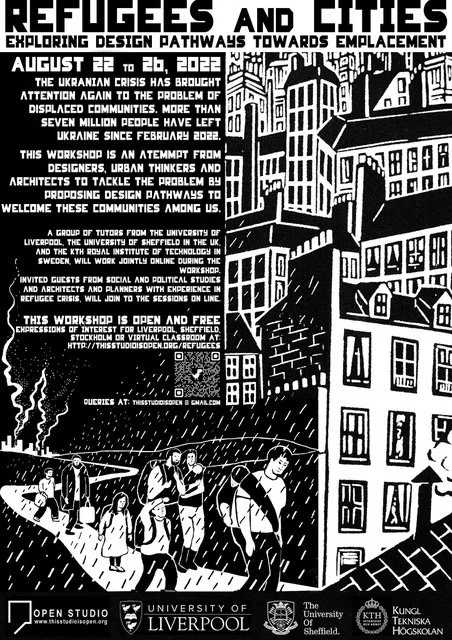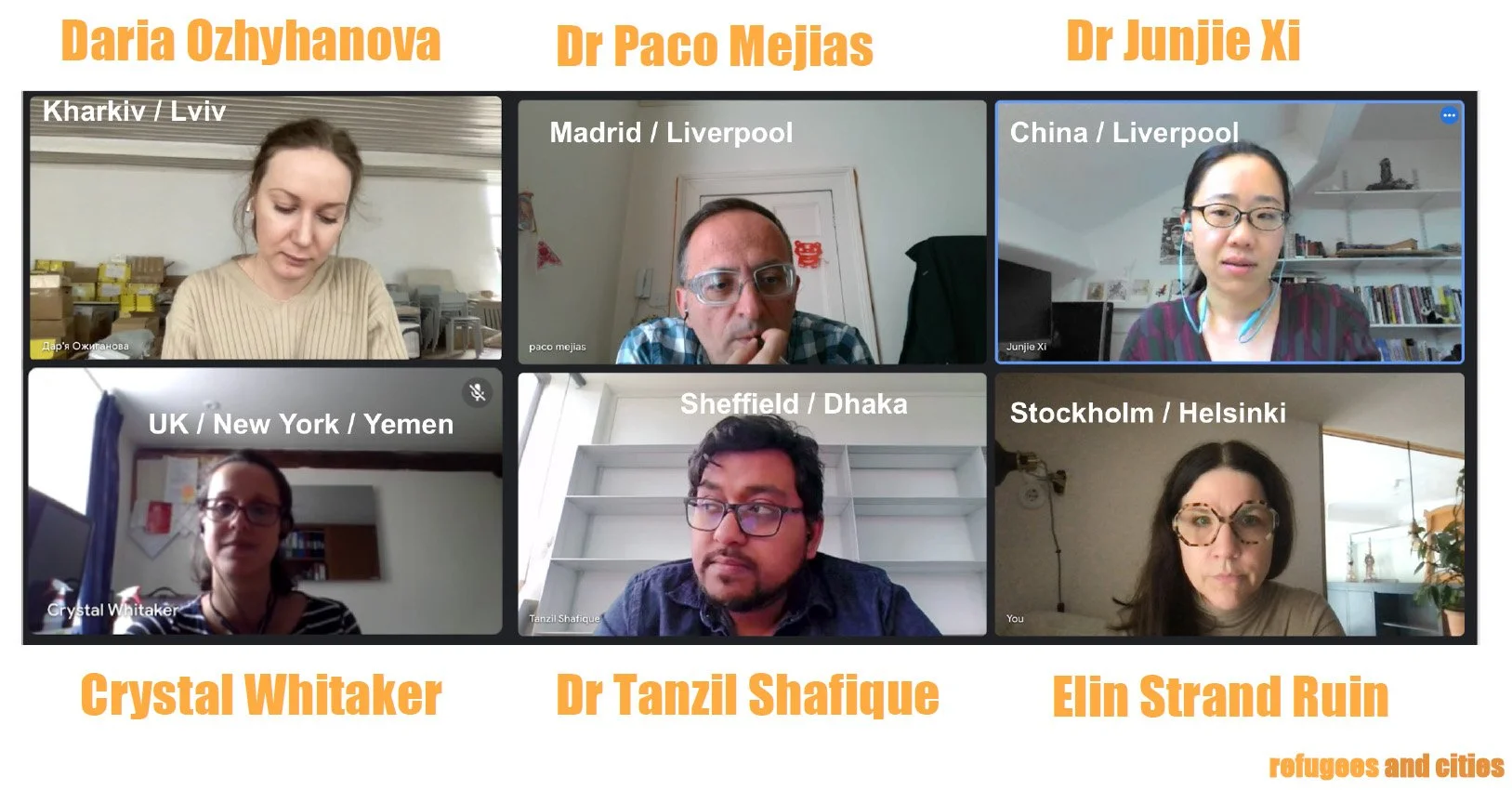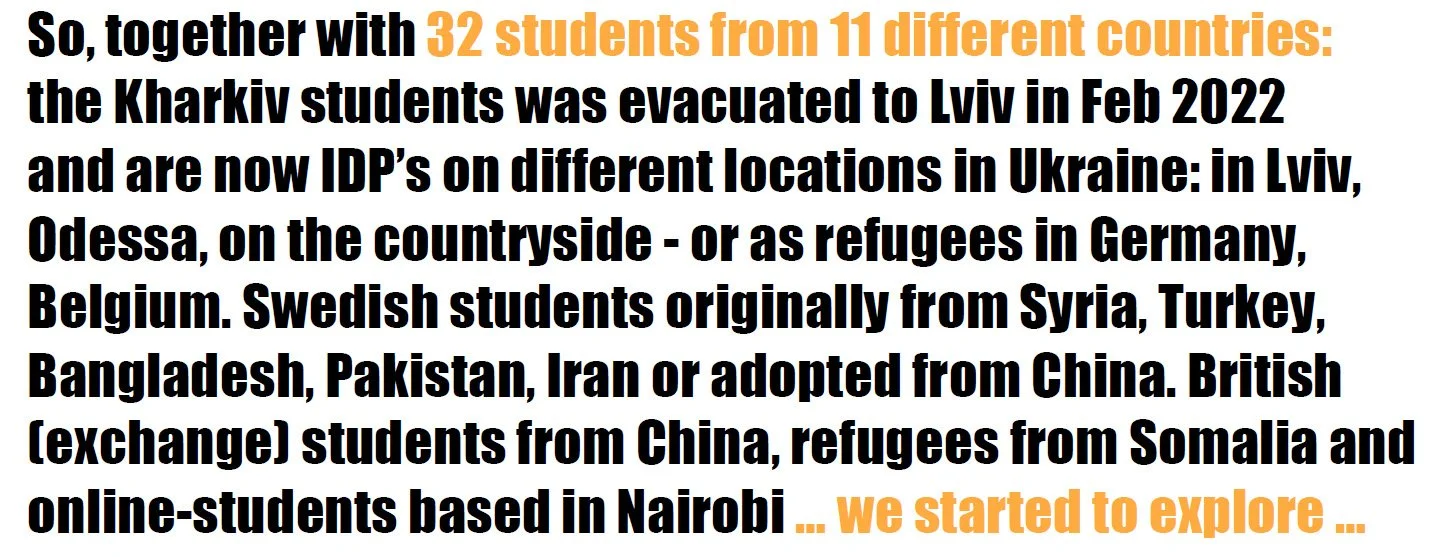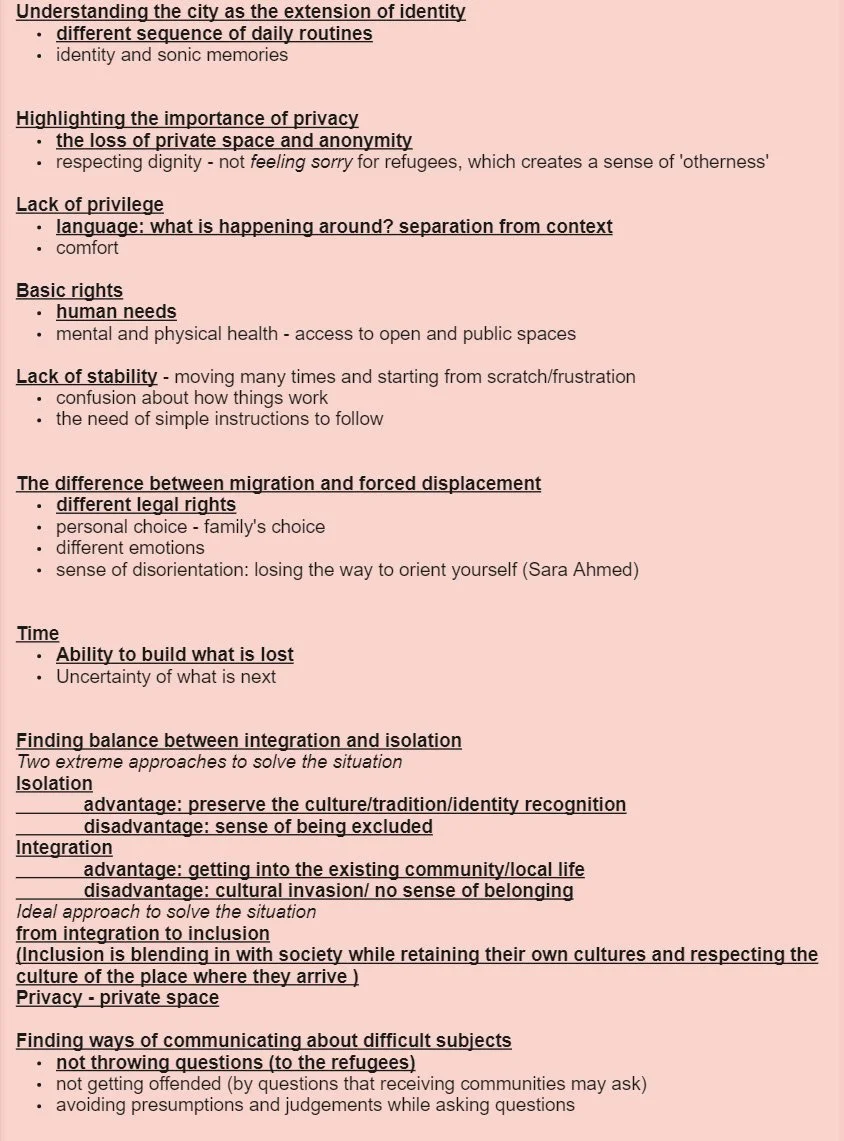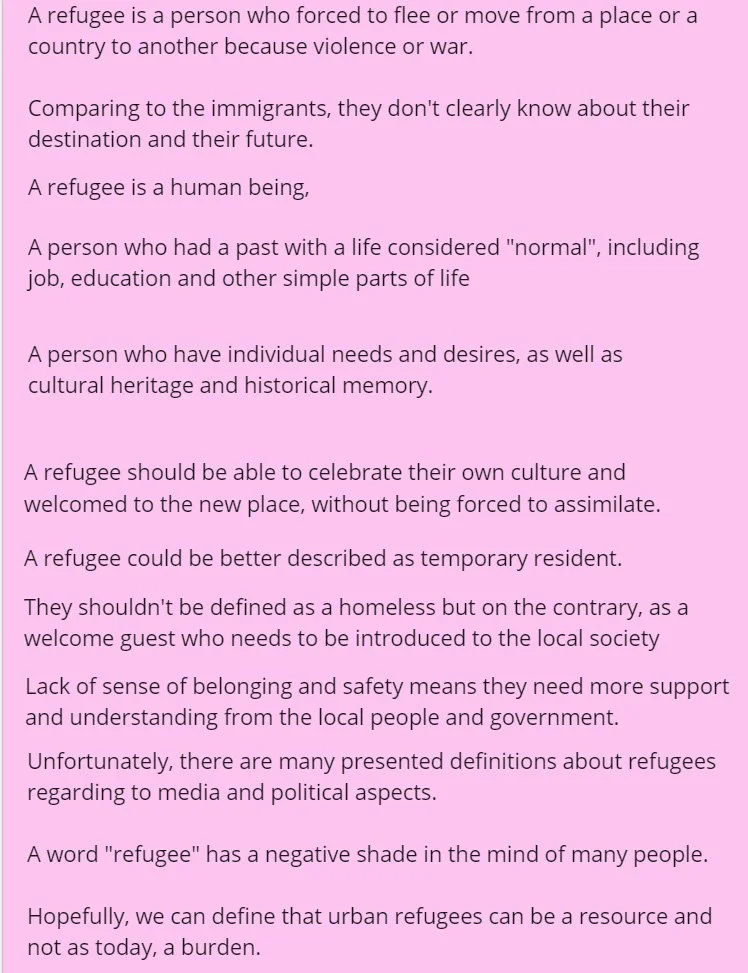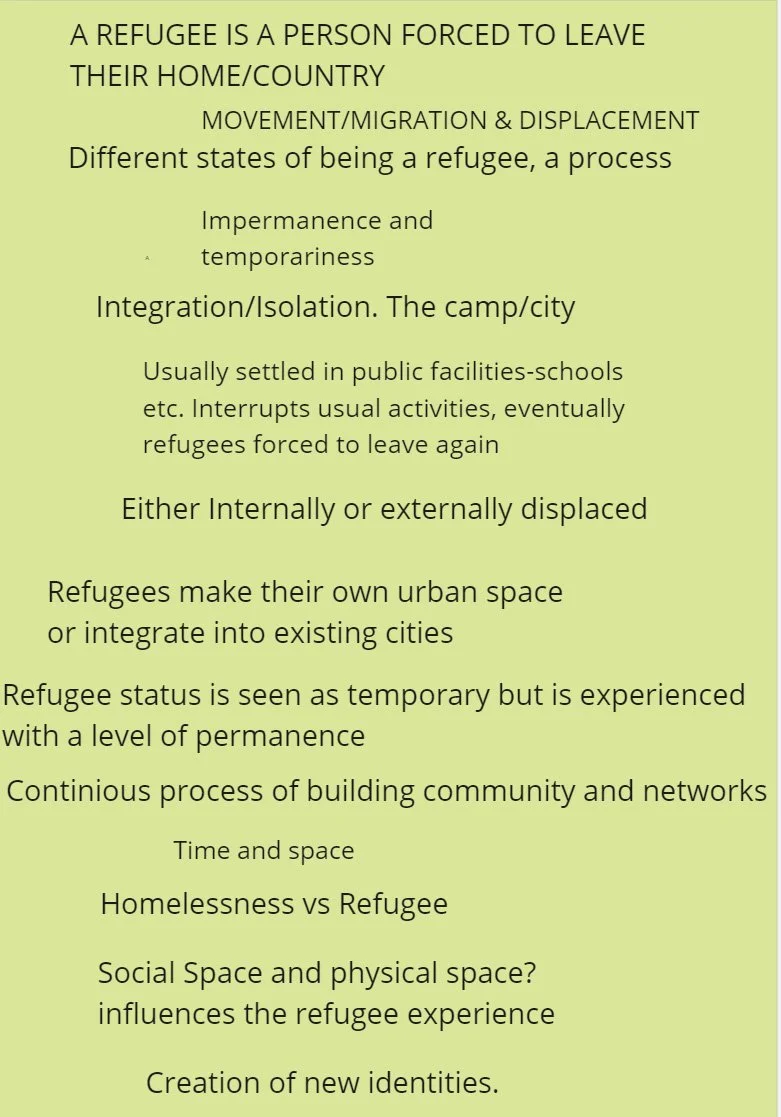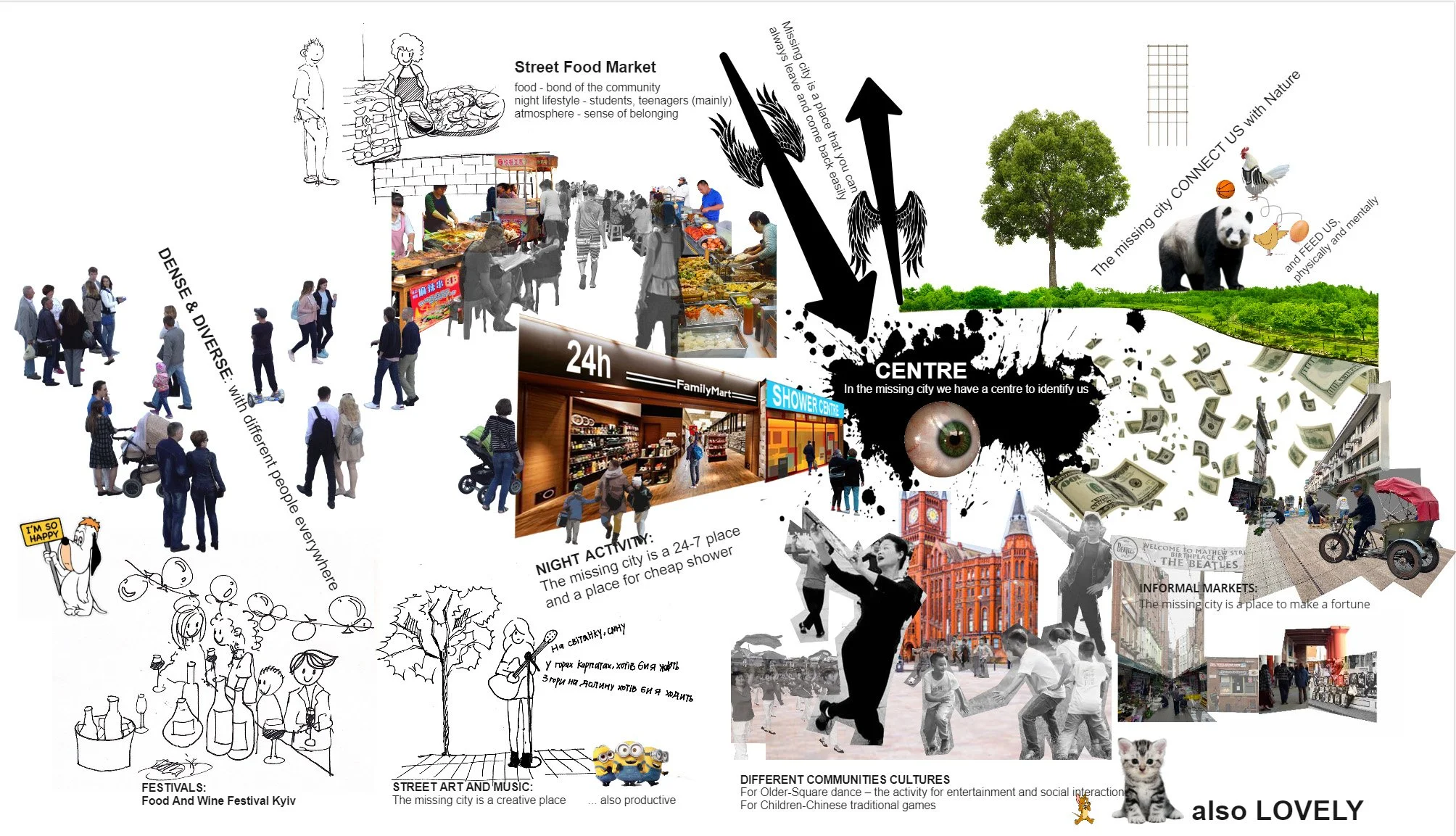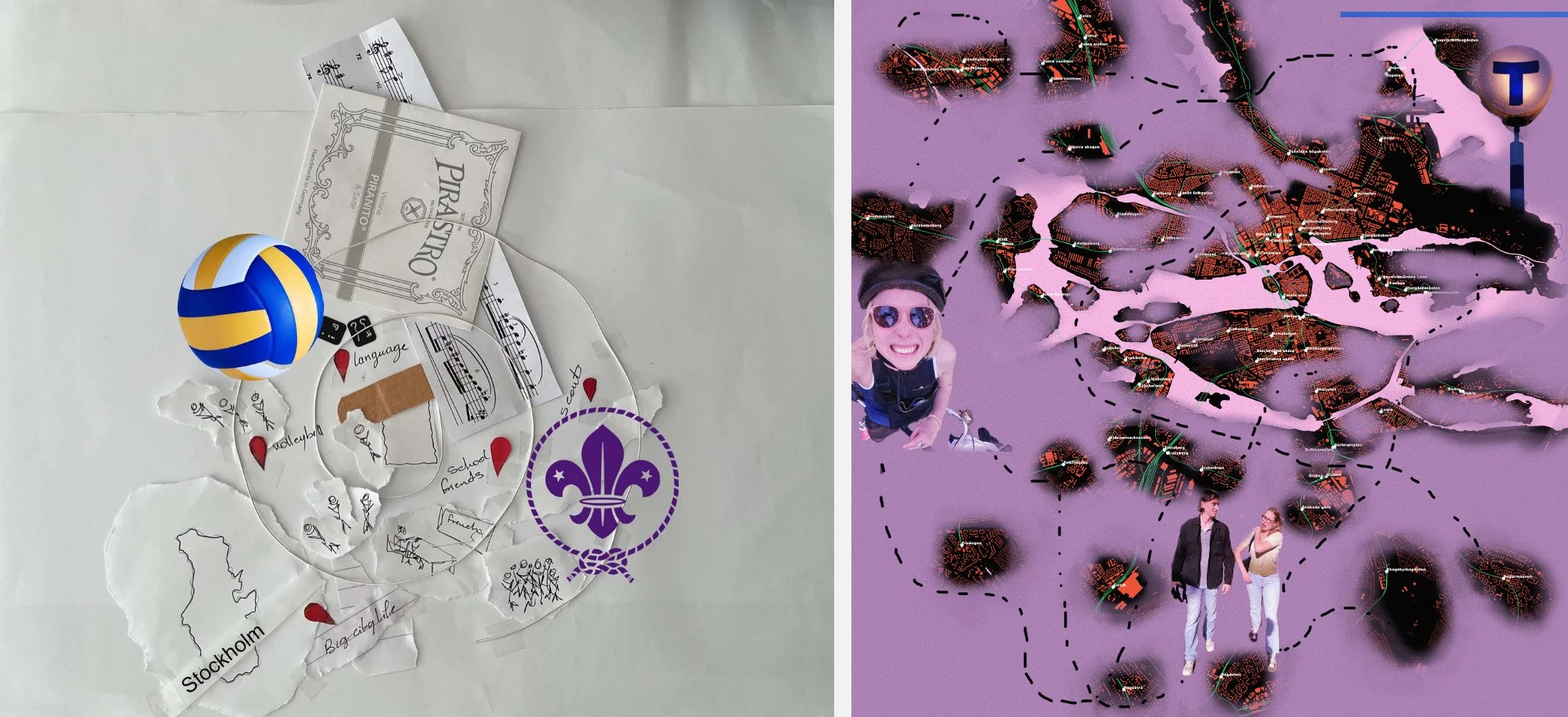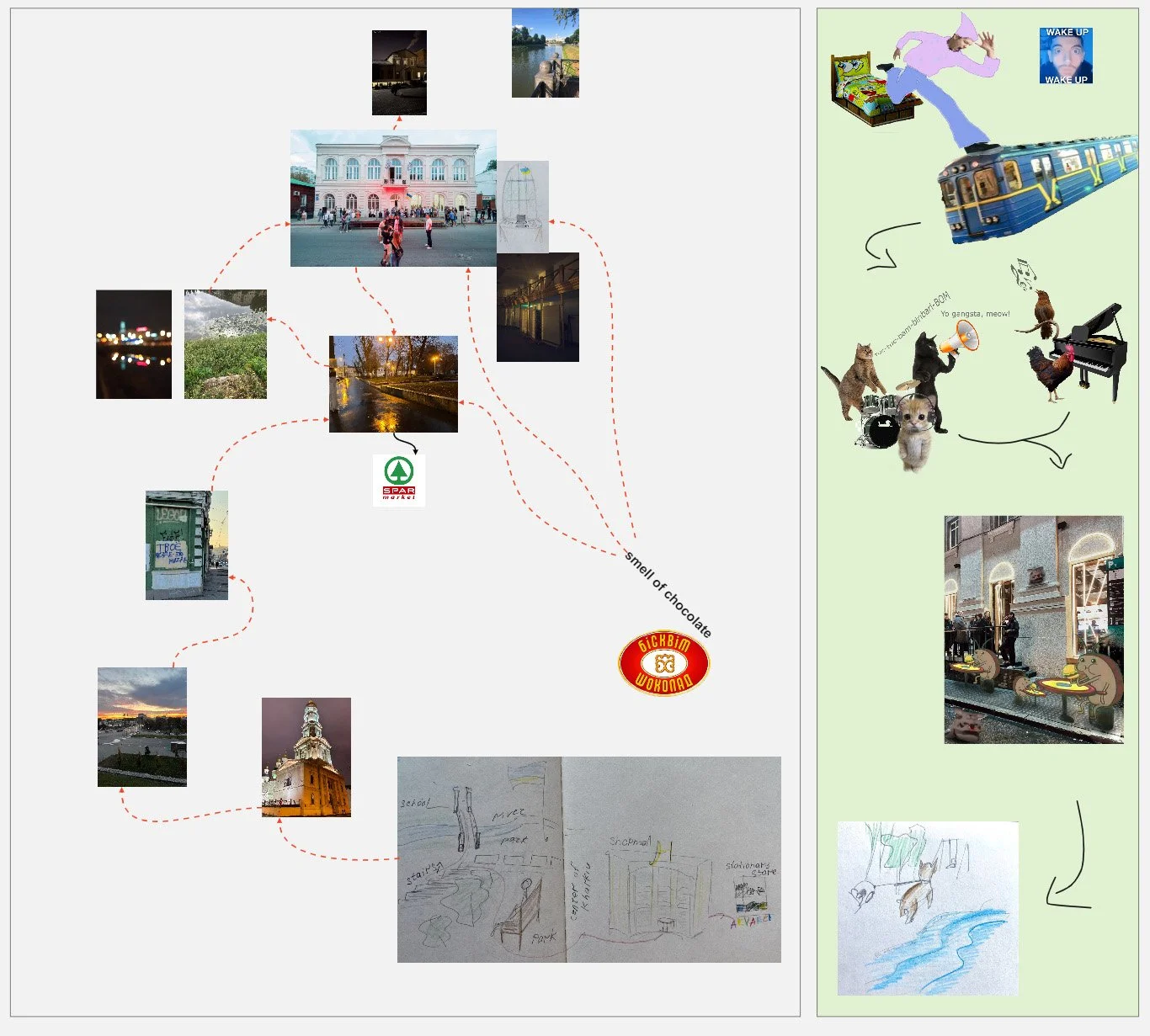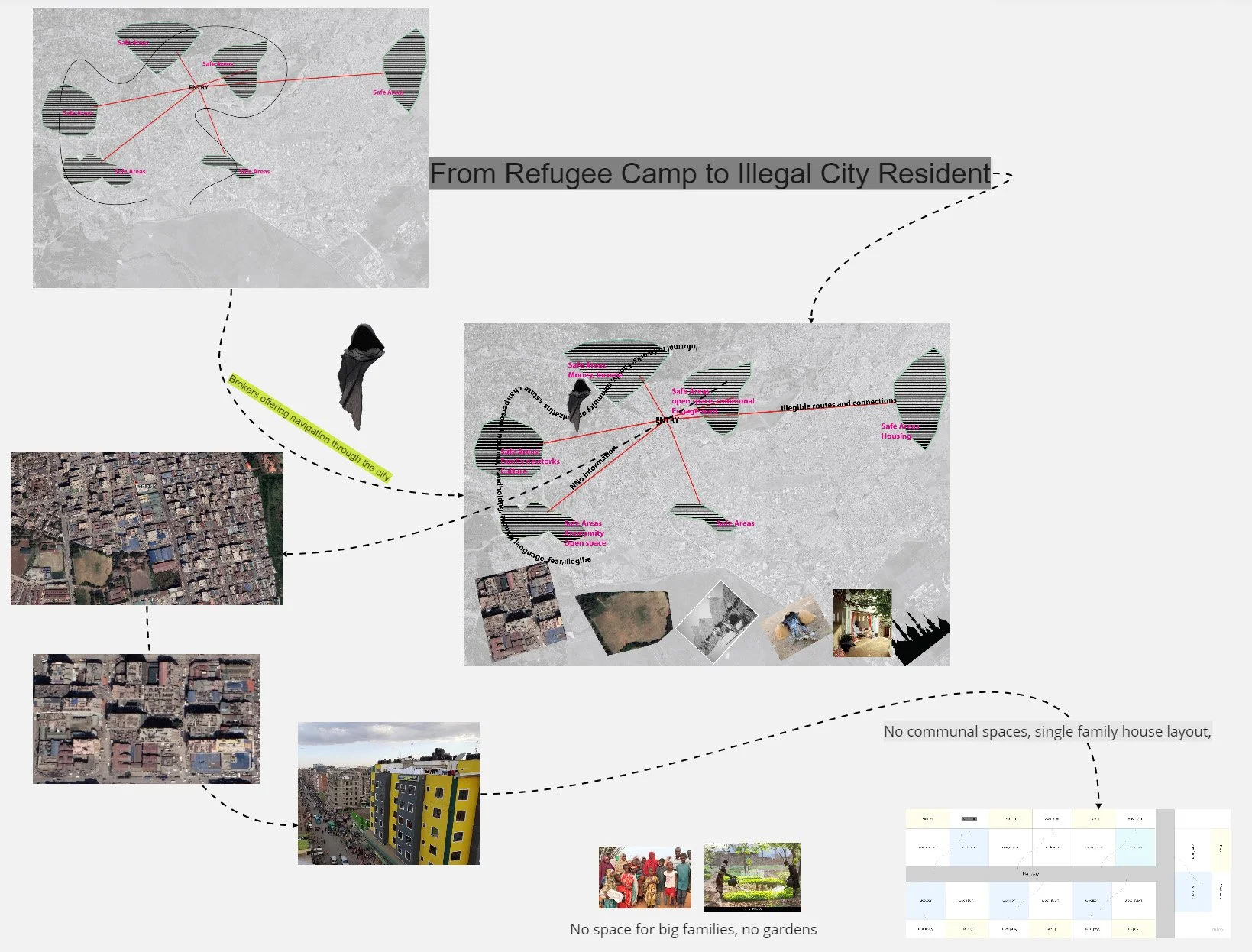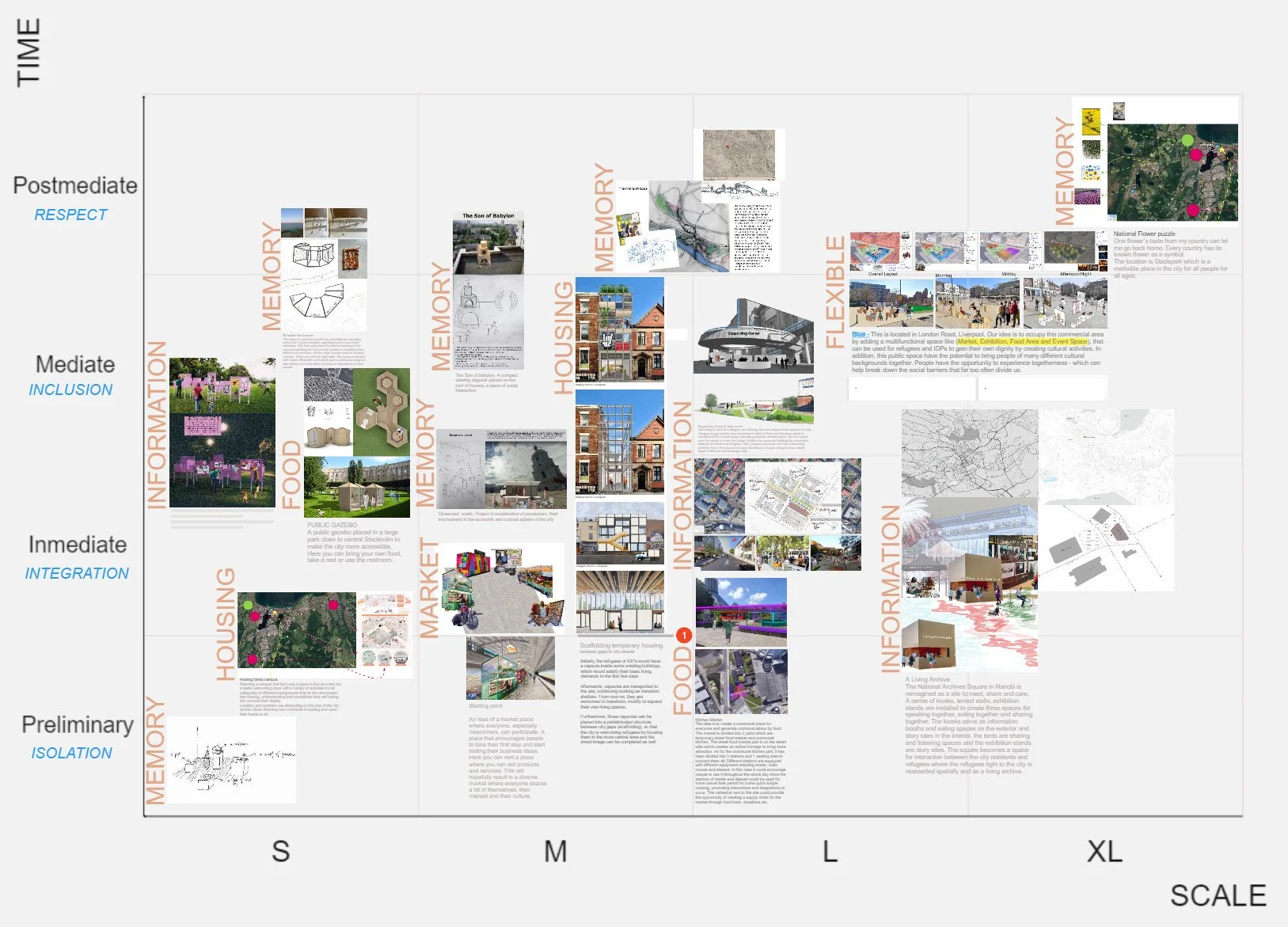REFUGEES and CITIES: Exploring design pathways towards emplacement
INTRODUCTION
According to UNHCR, currently, 84 million people are displaced globally. Many end up in refugee camps, many are dispersed into cities, many are trafficked, and many are lost in the process… We, as designers in the broadest sense, urgently feel the need to rethink how we can engage with such a global issue, that has been brought to our attention all the more by the crisis in Ukraine.
The workshop explores how to integrate and welcome displaced communities into our daily lives. Synergie between the locals and the migrants is a key factor here. Beyond empathy, we start with improvisations that can help the city welcome ‘refugees’.
We wish to broaden the notion of ‘displacement’ to mean a forced ‘unsettling’ of individuals, communities and people at many different scales. Therefore, we aim at global displacements (due to political, economic or cultural conditions), but also local ones: people displaced among us such as the elderly, the lonely, children, homeless, people with disabilities or impairments, etc. We see the core issue is that of providing a place for them, a sense of belonging, and we want to explore design ideas to tackle this problem. Design for us could range from any scale and domain, including but not limited to: architectural, urban design/policy, landscape, digital infrastructure, product and placemaking etc.
We start from a position of decoloniality, we do not aim to use the crisis as a showcase for our fantasies and utopian dreams as designers. Perhaps, the design could just be mapping the relevant actors and designing speculative interconnections between them. Put simply, we aim to be useful, to have some impact, to be sincere and have modest ideas that can be of help.
We will introduce the multidisciplinary dimension of the problem: we will have introductory talks by sociologists, politicians, anthropologists, psychologists, urban thinkers and architects. This will facilitate a complex understanding of the overall refugee/displacement crisis and move us away from naive, simplistic design ventures.
This workshop, therefore, is open to anyone interested in the current Ukraine crisis and the arrival of the refugees to the European cities, but we encourage other refugee situations as well. It is open to any allied discipline that practices a design approach: architecture, art, urban design, landscape, strategic design, product design etc. It is open to undergraduate/graduate students as well as professionals/academics.
We do not see ourselves as instructors to impart knowledge, rather, we are facilitators of a collaborative learning process. We seek participants who bring their own agenda, site, issues, problems, experiences related to refugees, displacements and the city.
METHODOLOGY
This workshop is a preliminary investigation of the proposed topic. We are aiming to set a framework to understand better the challenges represented by forced displacements and how architects and urban planners can contribute to better hosting and welcoming the people affected in our cities.
As with any other research, the path would be found by navigating the complexities of the problem. In this journey, getting trustworthy multidisciplinary information is crucial for understanding the multilateral aspects of the situation. The guests’ presentations aim to provide us with as much as possible background information.
We will trigger the discussion with a first question: How do we define a refugee in a city?
This question could be answered through different perspectives depending on where we position ourselves. The answer needs to be elevated to the public grounds, and this would be done through the group discussion that would convert personal approaches to consensus responses.
Every day, after the group working sessions, we will have a whole-workshop meeting online. In that meeting, every group will share their approaches, and we will agree on the next question to answer. At some point, we will also introduce the discussion of intended outputs to publish. The publication of our work would be important to create awareness among professionals and citizens about this situation.
TUTOR/FACILITATORS
Ms Daria Ozhyhanova, Programme Director BA, Kharkiv School of Architecture, Ukraine
Daria holds a degree in Architecture and Urban Planning, Kharkiv National University of Construction and Architecture. She worked in the Portal-21 architectural office with projects of historic buildings reconstruction, public and private interiors. In 2016, as a participant of the Urban Forms Centre civil organization, coordinated the conference on Gender Issues in Art, Architecture and Urban Planning. Co-author and coordinator of the Modernism Women awareness-rising project focusing on the contribution of women to science, culture and art. Curator of the School Module. Urbanism children’s educational project aimed at increasing young people’s participation in urban decision-taking.
Ms Elin Strand Ruin, Lecturer on Artistic Merit, The School of Architecture, KTH, Artist-Architect, S E S Studio Elin Strand Ruin, Stockholm, Sweden
Elin focuses on long-term participation processes in dialogue with local networks, governing actors and art-institutions through implementation of everyday functions designing public domesticities. The work operates in the borderland between performative art and architectural investigations. Strand Ruin has exhibited at leading artistic, architectural and planning venues around Sweden and Europe during the last 20 years and is active in the debate issuing public space. Selected projects: ‘The Kitchen Square’ (2019- ) Balder, Marabopuparken konsthall, Hallonbergen, ‘The Kitchen of Praxagora, 2.0’ commissioned by City of Stockholm (2021-2022), ‘The Blind Alley’ Gallery Depo, Istanbul, March, Tensta Konsthall, Oct (2022); She is part of the international research project MAPURBAN addressing the topic of urban integration in the three major European cities Berlin, Stockholm and London. https://research.kent.ac.uk/mapurban-eu/ Recent publication: https://www.routledge.com/Architecture-and-Feminisms-Ecologies-Economies-Technologies/Frichot-Gabrielsson-Runting/p/book/9781138304888 https://www.studioelinstrandruin.se/
Dr Junjie Xi, Lecturer University of Liverpool, UK
Junjie is a lecturer in architectural design and humanities at the University of Liverpool. She was previously a Postdoctoral researcher for the China Railway Group Limited and School of Architecture, Tsinghua University. Her project The Use of Flexible Architecture and Structures in the Design of Public Buildings was funded by China Railway and the research outputs will be used by this state-owned enterprise in their construction work in the future. She continues her research in railway stations and has completed a new book with Dr Paco Mejias - China’s Railway Transformation: History, Culture Changes and Urban Development, which will be published in late 2022. Apart from research in railways, she has further developed a research focus in the informal settlements in Bangladesh, aiming to provide a better sanitation system for the future.
Dr Tanzil Shafique, Co-director Open Studio, Lecturer and Program Director of Urban Design, University of Sheffield, UK
Tanzil completed his Ph.D. in Urban Design at the Melbourne School of Design where he also taught graduate urban planning and design studios. He is an international affiliate of the Informal Urbanism Research Hub (InfUr-) at the University of Melbourne. Previously he was a Research Fellow and Faculty at the Fay Jones School of Architecture + Design as well as practiced urban design as a Project Designer at the Community Design Center--both at the University of Arkansas, USA. His work in UACDC has garnered numerous AIA National Award for Urban and Regional Planning, as well as his writing on design philosophy and urbanism has been published internationally. He holds a professional B.Arch from BRAC University and an M.Arch in Ecological Urbanism from Rensselaer Polytechnic Institute in New York.
Dr Paco Mejias Villatoro, Co-director Open Studio, Lecturer University of Liverpool, UK
Paco is a registered architect and urban planner in Spain and RIBA chartered architect in the UK, and holds a Ph.D. in Architectural Theory and Design from the Madrid Polytechnic School of Architecture. He has been teaching Architectural Design since 1997, in Spain, Canada, the United States, China and the UK. He has been conducting workshops all over the world as part of events such as the Venice Biennale and the Alfa European University Training Network for Sustainable Urban Development (AURORA). As a practitioner, he worked for Zaha Hadid Office in London, before opening his own firm in Spain. He has been awarded in several competitions and nominated for the prestigious Mies van der Rohe European Architecture Award. Currently, he is teaching Architecture at the University of Liverpool, UK. He is a Fellow of the High Education Academy.
PRESENTERS
Professor Robert Mull, University of Brighton, UK.
Robert is Head of the School of Architecture and Design at the University of Brighton. An architect and an educator, Robert was Director of Architecture and Dean of the Cass Faculty of Art, London. He has taught widely in the UK and internationally and held visiting professorships in Vienna and Innsbruck. A member of the architecture collective NATO, he has always been committed to socially useful forms of practice and education. https://publica.co.uk/team-robert-mull/
Professor Susanne Wessendorf, Centre for Trust, Peace and Social Relations, Coventry University
Associate Professorial Research Fellow at the London School of Economic's, UK. International Inequalities Institute. Susanne’s research focuses on immigration, integration, ethnicity and race. She is a Social Anthropologist and has been doing research on migration, transnationalism and diversity for more than ten years. She has undertaken in-depth ethnographic fieldwork over long periods in complex urban settings, working with people of different age groups, ethnic, national and class backgrounds. Her work focuses on understanding new forms of social inclusion and exclusion in contexts of immigration-related diversity.
https://www.lse.ac.uk/International-Inequalities/People/Susanne-Wessendorf
Professor Laura Vaughan is Director of the Space Syntax Laboratory, University College London.
Space Syntax Laboratory provides a scientific approach to studying buildings and cities as socio-spatial systems. Her research spans across urban history, urban migration and settlement, and urban health. Through this she has collaborated variously with experts in history, geography, crime science, public health, anthropology, transport and planning. Her most recent book is Mapping Society (UCL Press), and her many research papers are available via: https://www.ucl.ac.uk/bartlett/architecture/people/prof-laura-vaughan Additional Links: Twitter: @urban_formation Blog: https://urbanformation.wordpress.com/
Mr Klas Ruin, Architect, Co-founder of Spridd, Stockholm, Sweden.
The aim of Spridd is to explore the role and abilities of architecture to respond to current challenges in society. The founders Ola Broms Wessel and Klas Ruin share an interest in architecture as social art, a profession that combines technology, art and politics. The office strives to be a creative platform, a laboratory open to like-minded architects and neighboring professions to explore the vision. http://www.spriddarchitecture.com/about
Professor Hans Ruin, Philosophy Department, Södertörn University, Sweden.
Hans is a professor of philosophy, Södertörn university (Stockholm). Co-founder and former President of the Nordic Society for Phenomenology. Co-editor of Nietzsche's collected works in Swedish. From 2010-2015 director of the multidisciplinary six-year research program ”Time, Memory, and Representation - recent developments in historical consciousness”. Recent publication: "Being with the dead. Burial, ancestral politics, and the roots of historical consciousness" (Stanford UP, 2019). https://www.sh.se/english/sodertorn-university/contact/researchers/hans-ruin
Ms Mariana Schiller, Senior Policy Officer, Housing and Land, Greater London Authority, UK.
Mariana is an urban planner with a background in research and community engagement. Prior to moving to London, she worked for LabCidade, a São Paulo-based research lab where she studied the management of public spaces in the city. She also led a small team of volunteers in implementing cultural projects and building emergency housing in an informal settlement. https://www.publicpractice.org.uk/people/mariana-schiller
Ms Kristjana Adalgeirsdottir, Architect, Board Member Architecture Sans Frontieres. Doctoral candidate Aalto University School of Arts, Design and Architecture, Finland.
Kristjana is an architect and researcher with focus is on humanitarian construction, sustainable project management in emergencies and cultural sensitivity in reconstruction. She was born in Iceland, graduated as an architect from Oslo School of Architecture in Norway and is currently living and working in Helsinki, Finland. She is a member of the IFRC shelter specialists roster and a Response Team member in ShelterBox, with experience from emergency response in the Philippines. https://www.asfint.org/en/board/kristjana_adalgeirsdottir
Ms Crystal Whitaker, Architect, Humanitarian specialist, UK.
Crystal has a technical expertise in the built environment and extensive experience in humanitarian affairs and international development. For the last 10 years she has been engaged in the fields of housing, shelter and settlements, and spatial planning with the UN, non-governmental and international organisations. She has worked in a range of disaster, conflict and displacement contexts in Africa, south Asia, the Middle East, the Balkans, and Latin America. Crystal studied architecture at the universities of Cambridge and London Metropolitan in the UK.
Mr Akif Akash Kazi, Architect.
Kazi is an architect educated at BRAC University in Bangladesh. He worked for Marina Tabassum's office in Dhaka before joining the World Food Programme team at the Rohingya refugee camp in Chittagong, Bangladesh, the largest refugee camp in the world with more than 900,000 inhabitants. He is currently pursuing postgraduate studies at Politecnico di Milano, Italy.
Mr Mustafa Rezazadah, Post-graduate student, University of Liverpool
Mustafa has more than eight years of communication and project management experience working in a variety of thematic areas, including nation-building, countering violence and extremism, promoting art and culture, and empowering women and young people. He is currently pursuing his Master's in Strategic Communication at the University of Liverpool and works as a part-time communication consultant. Additionally, he provides coaching and consultation support to youth in Afghanistan on a volunteer basis.
PREPARATORY SESSIONS
On-line preparatory sessions
WORKSHOP SESSIONS
"A refugee is a person with a well-founded fear of being persecuted for reasons of race, religion, nationality, membership of a particular social group or political opinion.”
THE UN REFUGEE CONVENTION (1951)
ANSWERS FROM DIFFERENT GROUPS:
UNIVERSITY of LIVERPOOL STUDENTS, UK
KTH STUDENTS, SWEDEN
KHARKIV SCHOOL OF ARCHITECTURE STUDENTS, UKRAINE
ON-LINE STUDENTS
The Missing City, University of Liverpool Students
The Missing City, KTH Students
The Missing City, Kharkiv Shool of Architecture Students
The MIssing City, On-line Students
The Welcoming City, Organised Matrix of Proposal
Proposals can be explored in detail on the MIRO board:
AUTHORS
Students:
Kharkiv School of Architecture, Ukraine
Myroslava Pavlova, Nikita Shulga, Daria Horovenko, Anastasiia Aniskina, Yeshaiahu-Paulina, and Yana Kyryniuk
Liverpool School of Architecture, UK
Jiangwen Lu, Alaa Al-Shamahi, Yu Qin, Zhangze Shao, Tianyong lan, Jiajun Zheng, and Jingwen Tang
KTH, Sweden
Anton Gumaelius, Moa Degerman, Ester Gustafsson, and Nour Espiro
Swedish University of Agricultural Sciences, Sweden
Samina Saleh
Yildiz University, Turkey
Hilal ÇaliŞkan
Professionals and Academics
Amna Qaiser, Academic KTH, Sweden.
Elahe Karimnia, University of the West of England, UK
Nausheen Anwar, Institute of Development Studies, University of Sussex, UK
Anastasiia Sliusar, Web developer
Paul I Mukwaya, Makerere University, Uganda
Majd Murad, Architect and Urban Planner, Sweden
Raquel Jerobon, Technical University of Kenya
